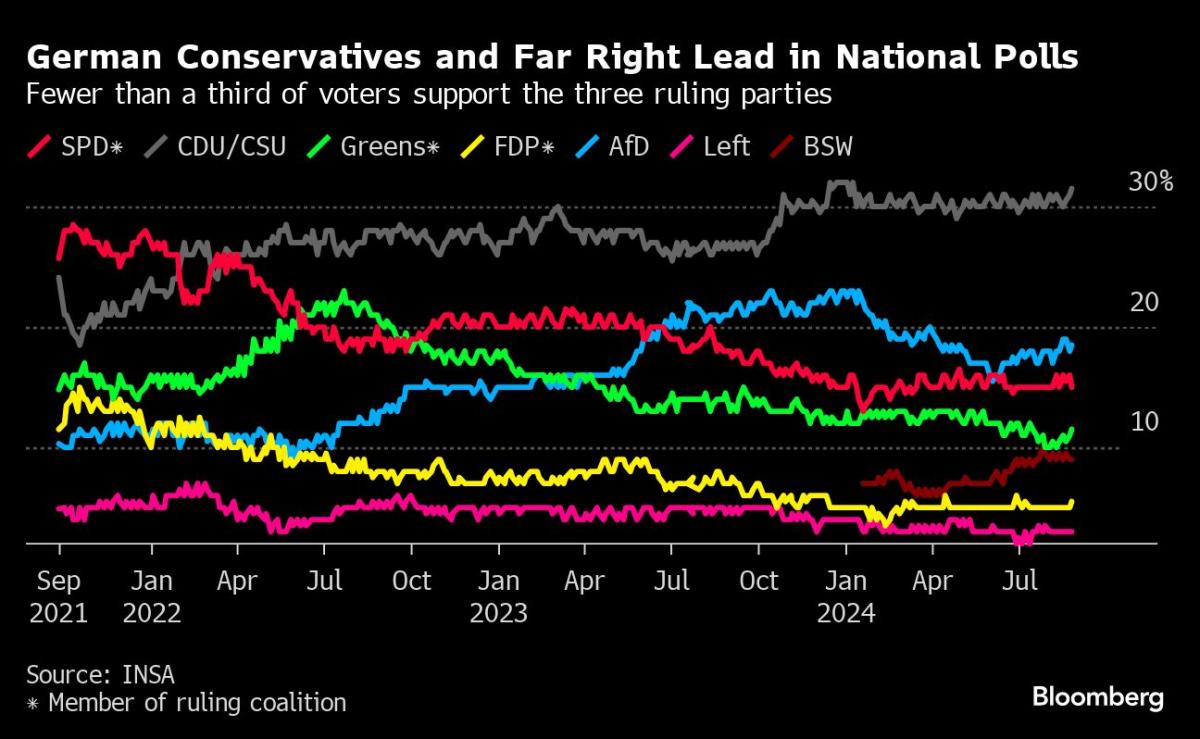(Bloomberg) — Sahra Wagenknecht and her new BSW alliance of the far left are set to play a key role in keeping the Alternative for Germany out of power in Thuringia despite the far-right party’s victory in Sunday’s state election there.
Most Read from Bloomberg
The BSW, which wants to curb immigration and stop arming Ukraine, was founded only in January after splitting from the Left party. It came third in the eastern German region with 15.8% of the vote, according to preliminary results, behind the AfD in first place on 32.8% and the conservative Christian Democrats second on 23.6%.
With its anti-immigrant and pro-Russia policies, the BSW tapped into voter frustration with Chancellor Olaf Scholz’s national coalition in a similar way to the AfD, highlighting how mainstream parties appear to have lost touch with some voters in parts of the former communist east. In Saxony, which also held an election Sunday, the AfD was narrowly beaten into second place by the CDU, while the BSW surged into third on 12% and could also join a coalition government there.
AfD officials in Thuringia say they’re ready to govern a federal state for the first time, but all other parties have shunned it. That makes a coalition led by the CDU with the BSW and the Left party the only path to a majority, though the AfD would still be able to block legislation that need a two-thirds majority to pass such as some judicial appointments.
“We have become a power factor in Germany,” Wagenknecht said Monday at a news conference in Berlin, adding that the BSW has a mandate in both regions to help form governments that “really represent the people again.”
“These election results, and our great success, are of course also a reflection of the mood in Germany,” she said. “It’s very much food for thought for all the parties, especially those who have governed at the federal and regional levels.”
During campaigning, Wagenknecht and her party allies slammed the ruling coalition’s military support for the government in Kyiv, which is worth almost €30 billion ($33 billion) in total, including future commitments.
Many voters in eastern Germany are uncomfortable with taking sides in the war and fear the country will be dragged into a wider conflict, opinion polls show.
A recent decision to allow the US to station conventional long-range weapons, including Tomahawk cruise missiles and “developmental hypersonic weapons” in Germany from 2026 has also been condemned by the BSW.
Russian President Vladimir Putin has said Russia could deploy medium and shorter-range strike weapons and increase its naval capabilities if the US executes the plans.
“People expect that on this point regional governments reflect their majority opinion,” Wagenknecht told reporters. “They can’t take these decisions but they have to exert their influence at the federal level to bring about change.”
Wagenknecht, who is married to former SPD chairman and finance minister Oskar Lafontaine, also reiterated her criticism of the federal government’s energy policies, which she says have stoked inflation and eroded the purchasing power of wages and pensions.
“It’s no wonder that those in power are punished and they deserved to be punished,” she said.
Officials from the three parties in Scholz’s governing alliance met separately Monday to digest the results of Sunday’s votes.
With just over a year until the next scheduled national election, they got less than 15% between them in each of the two states. The FDP was nowhere near the 5% threshold for getting into either parliament and the Greens fell short in Thuringia.
With Germany’s economy stagnating and migration a key concern, nationwide support for the three ruling parties has slumped to record lows.
National backing for the conservative CDU/CSU alliance is around 32% — roughly the same as the SPD, Greens and FDP combined — and the AfD is in second place on about 18%.
Scholz was quoted as saying Monday that the AfD’s successes in Saxony and Thuringia is “worrying” and that Germany “cannot and must not get used to this.”
“It is weakening the economy, dividing society and ruining our country’s reputation,” the German leader said in a statement to news agency Reuters.
Optimism that Germany would rebound in 2024 from two years of almost zero growth has faded. An anticipated jump in consumer spending failed to materialize and the country’s industrial sector remains mired in the doldrums.
–With assistance from Kamil Kowalcze, Michael Nienaber and Arne Delfs.
Most Read from Bloomberg Businessweek
©2024 Bloomberg L.P.

